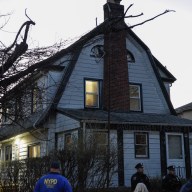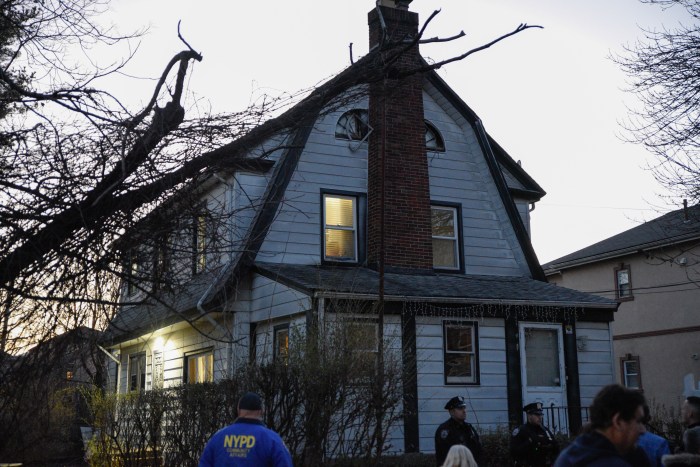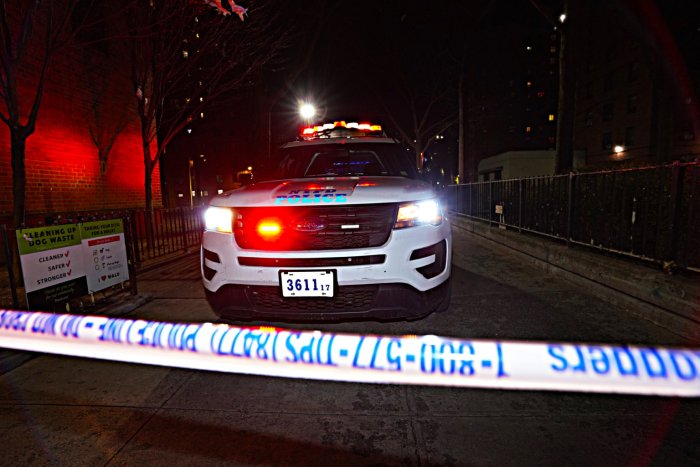By Philip Newman
The anguished screams of a woman suffering a beating by her estranged boyfriend filled the Queens Borough Hall boardroom Monday in a horrific demonstration of the function of the County Domestic Violence project.
The woman had called 911 to report that her former boyfriend, despite an Order of Protection, was trying to break into her home.
“Hello? Hello? Ma’am? Ma’am? Are you there?” the 911 dispatcher kept interjecting in a vain attempt to counsel the terrified woman.
The playing of the tape was part of an overview of the Queens County Collaborative Domestic Violence Project by Scott Kessler, chief of the Queens District Attorney’s Office of Domestic Violence Bureau.
The Borough Board also heard reports of progress in security at LaGuardia and John F. Kennedy International airports and community outreach efforts on water and sewer road projects.
Kessler explained, although parts of the tape needed no explanation, what was happening during the recording.
“At this point, he is pounding on the door demanding to be let in and now he is about to smash a window,” said Kessler. Then there was a crash of shattering glass.
More screaming, then a heavy thud, which Kessler said was the blow from a fist.
“This man was prosecuted just last week,” Kessler told Borough Board members, adding he was expected to get a sentence of five to 15 years. “He was prosecuted on a charge of burglary in addition to other charges for breaking in.”
Kessler said it had long been difficult to prosecute domestic violence cases because women often withdrew their complaints for a variety of reasons, but mainly because the men who beat them were their sole source of support.
“The great number of new immigrants also offer difficulties because in some countries beating a wife or girlfriend is not even illegal,” he said.
“But immigrants or native-born Americans, men beat women because somehow they feel they can get away with it,” Kessler said. “They would not, for instance, expect to attack their boss or some other man with impunity.”
Borough President Helen Marshall asked whether domestic violence was increasing in Queens.
“That is very difficult to measure, but what we believe is that more people are reporting it,” Kessler said. He noted Queens has 5,000 to 6,000 such cases a year with the peak in July and August.
William Hall and Allan Hoehl, federal security directors at John F. Kennedy International and LaGuardia airports, respectively, spoke about tightening security.
Hall said new screening terminals had been installed at Terminals 6,7,8 and 9 at JFK with Terminals 1,2, 3 and 4 next in line.
He said the newly hired screening personnel included many from the ranks of law enforcement and the military with women accounting for about 35 percent.
Hall said he had asked the federal Transportation Security Administration to consider JFK as a new training site for airport screeners.
In answer to a question about the new baggage-scanning machines, Hall said it takes time to install them because they are so large that new construction is often required.
Hoehl, a native of Glendale who retired from the New York Police Department as chief of the Manhattan South precinct, said LaGuardia baggage screening upgrading was “on target” for completion by Dec. 31.
“We have had many words of praise from passengers on our new procedures,” he said.
Hoehl said the TSA had decided to do away with what its director called “stupid rules.”
“For instance, if someone buys a cup of coffee, they will no longer be told to get rid of it at the check point,” Hoehl said. He said screeners would also no longer ask a passenger “did you pack your suitcase yourself?”
Hoehl said the airlines are not happy that their pilots must go through security. “But we want to make certain a pilot really is a pilot.”
He added, “We get reports all the time of burglaries at homes of pilots or other airline personnel.” He also noted even screeners themselves have to go through security.
Sybil Dodson, director of the city Community Outreach and Notification, spoke about the difficulties of notifying citizens when water and sewer lines are to be dug up and water shut off.
Dodson conceded there are problems. But she said progress had been made in notifying residents before water is shut off and things were better now than a few years ago, “when the first you knew they were going to cut off your water and dig up the street was a bunch of workers showing up outside.”
Reach contributing writer Philip Newman by e-mail at Timesledgr@aol.com or call 229-0300, Ext. 136.
































